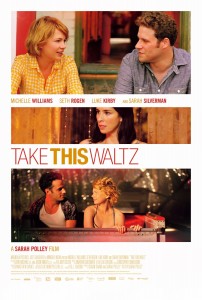
Currently Showing via Video OnDemand
Director: Sarah Polley
MPAA Rating: R
Film Pulse Score: 6.5/10
Take This Waltz is Canadian actress Sarah Polley’s sophomore outing as a director after showing remarkable talent as a feature film director with 2006’s Away From Her. Though not as strong as her first feature, her latest film (though overly long) is quite good and deftly handles a woman’s relationship with her husband and that woman’s growing attraction to a neighbor. I do not recall ever seeing a love triangle shown quite like this before, and the result is a mixture of exhilaration and frustration. Ultimately, the unique dialogue and striking performances of Michelle Williams, Seth Rogen, and Luke Kirby are enough to recommend the film to discerning viewers.
During what I think of as “act one,” we see Margot (Williams) involved in a meet-cute with Daniel (Kirby). When they share a cab from the airport (they have been sitting next to each other on a plane), they discover that they live across the street from one another. We have the impression that he is definitely drawn to her, but it is unclear what her feelings are toward him. However, the film reveals that while Daniel is much more open and clear about his motives and desires, Margot is more shy and enigmatic by nature. The initial one-third of the film also shows us Margot’s relationship to her husband Lou (Rogen). It is an odd relationship for a couple married for five years. They act more like children with one another; they are playful and loving, but in a non-sexual way. Their dialogue alone suggests they think they know each other quite well but may not know each other at all.
With “act two,” we see more of the ever-growing relationship between Margot and Daniel. While he seems to actively pursue her, he does so in an almost passive way so that Margot comes across as the instigator for the furthering of their relationship. I do not see any manipulation in Daniel’s motives; instead, it just appears to be the continuation of the two personalities to which we are introduced in the film’s opening scenes. Margot is initially unsure of what she wants, but Daniel’s attitude, demeanor, and character is too appealing for Margot to indefinitely ignore. The “courting” scenes are exceptionally drawn, and I could understand why these two people might be falling for one another.
In the last third of the film, Lou and Daniel are introduced to each other quite by chance; Daniel is, after all, Lou’s neighbor, too. In a short but powerful scene, Lou realizes that something has been going on between Margot and Daniel. The married couple does not really speak of it, but Lou does encourage her to go after Daniel after Daniel packs up and leaves his home (presumably to protect himself from heartache and not be the cause of breaking up a marriage). Margot does find Daniel and the two become a couple. Are they happy? Should they be together? What kind of relationship do they have compared to Margot’s relationship with Lou? Has Margot made an unforgiveable mistake? It is all in the eye of the beholder.
The script and direction is marked with scenes and dialogue that is simultaneously distinctive and naturalistic. While many scenes are “talky,” there is great use of silence throughout. The characters are not really easy to love or relate to which makes the leads’ performances all the more important. Though arguable that Williams, Rogen, and Kirby have been better, they are playing roles quite different from what they have done before. Kirby has mostly played in television roles, though he has a good part in The Samaritan (reviewed on this site); I found his performance to be the most interesting of the three. Rogen is used to playing various comedic roles, but this is a straight role that he truly inhabits and allows the audience to see that he is not a one-trick pony. Finally, Williams has wonderfully played numerous complicated women, including women who seem to walk that fine line between sanity and lunacy. Here, she creates an even more complex woman whose every word, action, and facial expression is open to interpretation.
Polley has given us much to think about in her second feature film. While it is not one of the best films I have seen recently, it is worth a look just for the complexity of the relationships presented and its investigation of the love-triangle members’ motivations, feelings, countenances, and unspoken thoughts.







One thing I left out is the soundtrack the omission of which has bothered me since writing the review because the songs are a prominent element. I think I left it out largely because I could not decide whether or not I liked the soundtrack. I believe viewers will either find the songs annoyingly in-your-face or perfectly suited for the film’s overall tone, style, and craftsmanship (or “craftswomanship” in Polley’s case). I’d be interested in what people thought of this particular element.
Wow, If I’d heard of this movie before I read that or if I’d seen
the preview first, I would have been like ew, I don’t want to see
that, no mushy mushy for me. I generally don’t like the movies
where girls and boys kiss and fall in love and stare at the stars
and build sand castles together and count each others’ hair
follicles and ride off into the sunset on rainbow unicorns petting
kittens. If there’s no potential that I might wet myself from
jumping in fear, it ain’t my bag of butterflies. Plus, I’ve never liked Seth
Rogan in any movie. He’s too angry and yelly all the time. But,
after I read your review, I was like hmm, I’d kinda watch that. Even
though you gave it a 6.5 you made it sound interesting.
Bravo good sir, bravo.